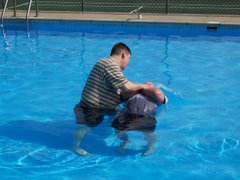My initial reaction in these types of situations used to be to immediately come to God's defense and remind the individual(s) of His sovereignty and purpose over and through trials in life (James 1.2-4, Romans 8.28ff). The longer I have been in ministry however, the more I have come to realize that this all to common reaction is more than just the expression of frustrated and immature Christian (as true as that may be). I have also come to view these cases and claims as an indictment of the local church. The more I minister to the "formerly churched" and listen to their stories of despair and confusion, the more my heart cries out, "Where was the church?"
Now, before we go any further, let me say that most of the time the claim that "God wasn't there," is rooted in an inadequate understanding of who God is and how He works. For some reason many in the world today have developed a view of God that has reduced Him to favorite neighbor status on Halloween night. You remember the favorite neighbor don't you? They were the family down the street that always had the best candy and gave it away in liberal amounts. All you had to do was don your mask, knock on the door, hold your bag out, and get lots of goodies. Regardless of what TBN's preacher of the week claims, God doesn't work that way! When life gets tough, you can't just throw on your "Christian mask," knock on God's door in prayer, and expect "goodies." We'll save the remainder of the discussion about God's character for the future, but let me remind you that James clearly teaches that for a trial to accomplish the purpose of producing godly character and maturity, we must persevere through that trial.
In spite of numerous commands in Scripture to persevere, we must not forget that one of the means God has given to help us persevere is the local church. Scripture teaches that God will not place more temptation on us that we can bear. Scripture, however, does not call on us to bear this temptation on our own. Rather, the explicit teaching of Scripture is that we are to lean on one another as we journey together to grow in Christ's likeness. Examples of this teaching occur in Galatians 6.1-10, 1 Thess. 4.18, 5.11, 5.14, Hebrews 3.13, and Hebrews 10.25. Other examples can be seen in Paul's repeated sending of teachers to specific churches for the express purpose of encouraging them to persevere in their work of the gospel (Ephesians 6.22; Colossians 4.8; 1 Thessalonians 3.2).
In Galatians 6.1-10, the Apostle Paul provided the church with clear guidelines for "Life Together" (the title of an excellent book by Dietrich Bonhoeffer). In this brief passage, we learn several important truths that should promote and protect the health of the church. First, we learn that we have a responsibility as Christians to mend relationships in the church that have been fractured by sin (6.1). Using the language of a doctor setting a broken bone, Paul commands the church to restore wayward members. This task is accomplished through gentle and loving confrontation of sin (and as we learn elsewhere in Scripture repentance on the part of the sinning person). Everytime we encounter someone that has fallen away from the church and claims that God wasn't there for them, we should ask ourselves, "Where was the church?" If sin had so skewed their view of the church and the world that they walked away from God's people, why weren't God's people there to stand in the gap?
The second truth we learn in this passage is that we have a responsibility to bear one another's burdens (6.2). When life overwhelms us, we should be able to rely on the strength of our brothers and sisters in Christ. Life Together should be a life that is shared. It is the life described in Acts 2 where the early church sold possessions in order to give to those who had need. When life so overwhelms someone that that they begin to falter under the weight of their burden, we as brothers and sisters in Christ should be there to help shoulder the load. There should never be a situation in the church of the Lord Jesus Christ when someone loses a loved one, loses a job, sees their marriage begin to crumble, or is diagnosed with cancer and begins to question whether or not God is there because they are by themselves in the midst of that trial. They should see His presence everywhere they turn as the body of Christ begins to rally around them in support and encouragement. Again, when we encounter someone that has obviously quit following Christ because they quit fighting the good fight, we should ask ourselves, "Where was the church?"
The third truth we learn from this passage is that we have a responsibility to carry our own load (6.5). The word for load here is different than in verse two and contextually can be interpreted to understand that it refers to every Christian's responsibility to grow in Christ. This load is similar to the pack that a soldier would carry on a journey. It may be difficult to carry, but with the grace of God it is a manageable load. Whenever I encounter someone with a faulty view of God's providence who has decided to lay down their cross rather than bear it, I still ask "Where was the church?" Were they equipped with a biblical worldview and the means/knowledge to employ the spiritual disciplines so that they would persevere through difficulty? Did the church do its job of "teaching all that [Jesus] has commanded" in discipling new Christians? If trials produce not only godly character, but perseverance itself (James 1.2-4) then we must be careful to walk with new Christians because they have neither.
The fourth and final truth we glean from this text today is seen in verses seven through ten.
Do not be deceived: God cannot be mocked. A man reaps what he sows. The one who sows to please his sinful nature, from that nature will reap destruction;
the one who sows to please the Spirit, from the Spirit will reap eternal life. Let us not become weary in doing good, for at the proper time we will reap a harvest if we do not give up. Therefore, as we have opportunity, let us do good to all people, especially to those who belong to the family of believers.
You reap what you sow. Many Christians know this text but they strip it from its context. For proper application of this final truth, you have to remember what Paul has said in verses one through six. Churches reap destruction when they fail to restore broken relationships and bear burdens (their own and others'). This work is hard work. That is why Paul admonishes the Galatian church not to become weary in doing good - especially to the family of believers.
"Life Together," it is a beautiful sight to behold. Over the past few weeks our church has had numerous opportunities to share the load of our brothers and sisters. A member is diagnosed with breast cancer and the women's ministry commits to fast and pray frequently for healing and spiritual growth through the trial, to help with the housework until treatment is over, and to provide meals and childcare whenever needed.

This past week, as a church, we were able to help a family that has experienced a number of financial difficulties over the past few years as they have pursued the ministry to which God has called them. Two years ago a vehicle that had purchased in 2002 developed severe engine problems and quit running. For a reasons we won't go into, the warranty would not cover the engine. Regardless of the reason why they couldn't get the vehicle fixed, there it sat in the parking lot of the service department for over two years, useless. They honored their promise to pay on the note for the car and as a result were forced to make do. Over the past month, members of CrossRoad Church, recognizing a need (a burden), rose up and sought to help shoulder the load of this couple that is new to our church but already dear to our hearts. A mechanic in our fellowship mentioned that if we could get an engine, he would install it free of charge. Behind the scenes, members began to collect the money to purchase the engine. Our mechanic (with permission of the dealership) "kidnapped" the vehicle, towed it to his shop, and installed the engine. We presented the vehicle to our family in Christ this past Wednesday evening (hence the picture of the Jeep Liberty at the top of the blog). They were speechless. They had no idea we had set out to help. As the husband sat there in shock, the wife (who was weeping) simply said "God is good."
He is good. And He is there, in the midst of their trial (and the cancer patient's trial), through the action (and even confrontation) of the church. In the past few weeks, as I have shared with friends about the blessings of belonging to CrossRoad Church, many (both members and nonmembers) have said, "I have never been a part of a church like that." What a shame. As I read the New Testament, it seems that it if we were more diligent in applying Scripture, we would all belong to churches like this one. CrossRoad Church has a long road ahead as we seek to become the local church God wants us to be. We are in our infancy as a local body of believers, but I praise the Lord that he has surrounded me with brothers and sisters in Christ who are committed to sharing their lives and pushing me to be all that I can be in Christ.
Soli Deo Gloria,
Chris




